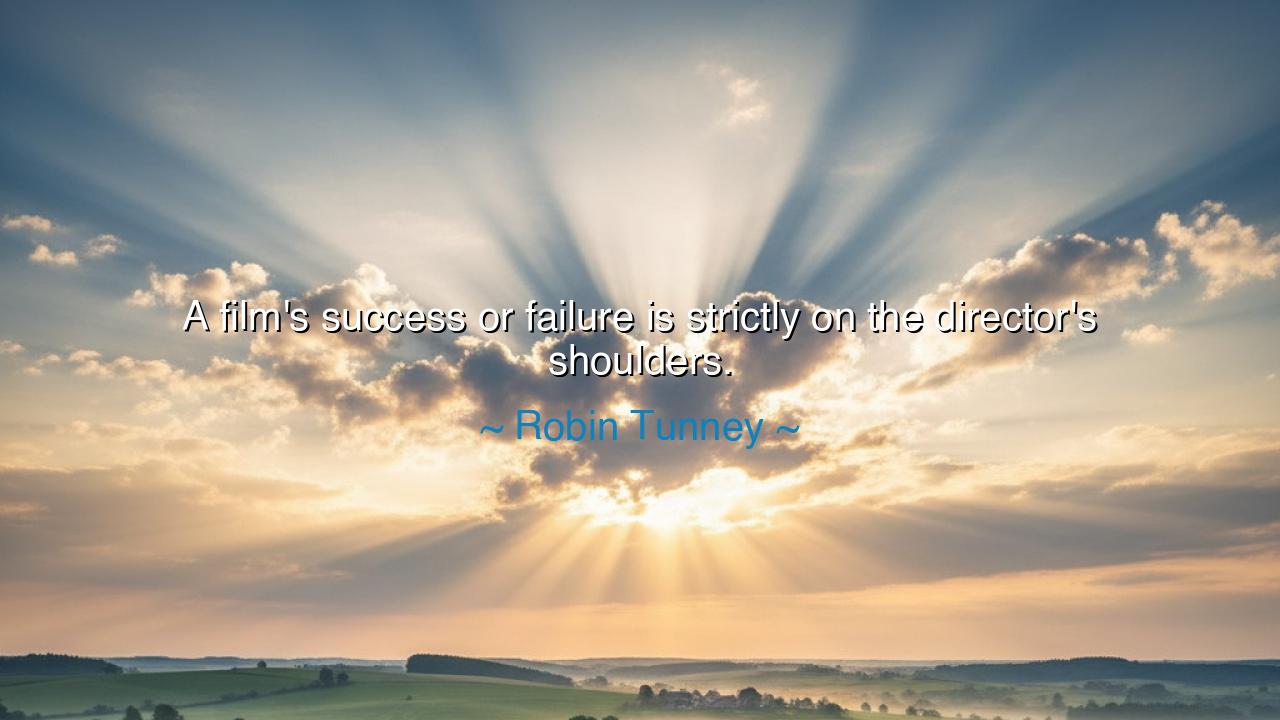
A film's success or failure is strictly on the director's






Host: The late afternoon light filtered through the window, casting soft shadows across the room. Outside, the world was calm, the stillness of the moment wrapping around everything. Jack sat with a cup of coffee in his hands, the warm liquid swirling gently as he thought over the words he had just read. Jeeny stood by the window, her back slightly turned, her gaze focused on the fading light outside. The quote from Robin Tunney had hovered between them, quietly demanding attention.
Jeeny: “I’ve been thinking about this quote from Robin Tunney: ‘A film’s success or failure is strictly on the director’s shoulders.’ There’s something about that, isn’t there? It’s like she’s saying the director has ultimate responsibility, that everything rests on their vision, their decisions.”
Jack: “Yeah, it’s a bold statement. I mean, in some ways, I get it. A director is the one who has the final say in how everything comes together—the story, the pacing, the actors, the visuals. They’re the ones who mold the film into what it becomes. But at the same time, isn’t it a bit much to say it’s all on them? What about the actors, the writers, the crew?”
Jeeny: “I think that’s the point she’s making. Everyone involved in the process plays a role, but ultimately, it’s the director’s vision that dictates how all those pieces fit together. It’s their job to hold the big picture, to take all those moving parts and turn them into something cohesive. If a film fails, it’s the director’s responsibility to ensure the vision didn’t get lost along the way.”
Host: The quiet in the room deepened, as if the weight of their conversation was slowly sinking in. Jack shifted in his seat, his fingers absentmindedly tapping the side of his cup as he processed Jeeny’s words.
Jack: “It’s true that the director has to bring everything together, but I still feel like there’s something missing in that idea. If the film fails, it’s not just about one person’s decisions. There’s so much that can go wrong—scheduling, budget, external pressures, actors not giving their best performances. The director can only do so much, right?”
Jeeny: “True. But think about it this way—a director’s vision has to guide everything, even in the face of those challenges. They are the ones who decide how to adapt when things go wrong. If an actor isn’t delivering, or if the budget gets tight, the director still needs to make sure the essence of the film stays intact. That’s why the director’s vision is so important. It’s about holding the line, even when everything else is in flux.”
Jack: “Okay, but it still feels like you’re putting too much blame on them. A film isn’t just about the director’s idea; it’s a collaboration, right? It’s a group effort. I can’t imagine putting everything on one person’s shoulders and saying, ‘This success or failure rests solely on you.’”
Jeeny: “But isn’t that the nature of leadership? In any creative field, the leader has to be the one who coordinates the vision. It doesn’t mean they do it all themselves, but it means they are ultimately the ones who shape the end result. You can have all the great actors, a fantastic script, and an amazing crew, but if the director doesn’t unify those elements, the film can still fall flat.”
Host: The air in the room seemed to settle, thick with the tension of Jack’s resistance and Jeeny’s conviction. It was as though they were both dancing around the very essence of what it meant to be a creator and a leader, particularly in the world of film. Jack’s fingers tapped more slowly against the cup now, as if the rhythm of his thoughts was finding its way.
Jack: “I think I’m starting to get what you mean. It’s like the director’s role is almost like that of a conductor in an orchestra. They aren’t the ones playing the instruments, but without them, there’s no harmony. They’re the ones responsible for making sure the vision doesn’t get lost, even when the pieces aren’t exactly falling into place.”
Jeeny: “Exactly. The director brings everything together, ensures it flows, creates that unity. And when it’s done right, the director’s vision elevates the work. A good director can take chaos and turn it into something beautiful. But if they fail, the whole film can fall apart.”
Jack: “I see what you mean now. The director isn’t just an overseer—they’re the one who steers the ship. If they’re not able to manage the creative direction, the entire film can lack coherence, even if everything else falls into place. The director has to be able to make those decisions that shape the experience.”
Jeeny: “Yes. And that’s why the director has such a powerful role. Their vision and leadership are what make a film stand out, or fall flat. It’s their responsibility to make sure the film resonates with the audience, to make sure the experience is complete.”
Host: The room felt quieter now, a deeper understanding settling between them. The tension of responsibility, of creativity, of leadership in the world of film, had shifted into something more nuanced. It wasn’t about blame or control—it was about vision, leadership, and the delicate balance of bringing all the elements together. The director, in this sense, wasn’t just the leader—they were the unifier, the one who could turn a chaotic process into something cohesive and impactful.






AAdministratorAdministrator
Welcome, honored guests. Please leave a comment, we will respond soon